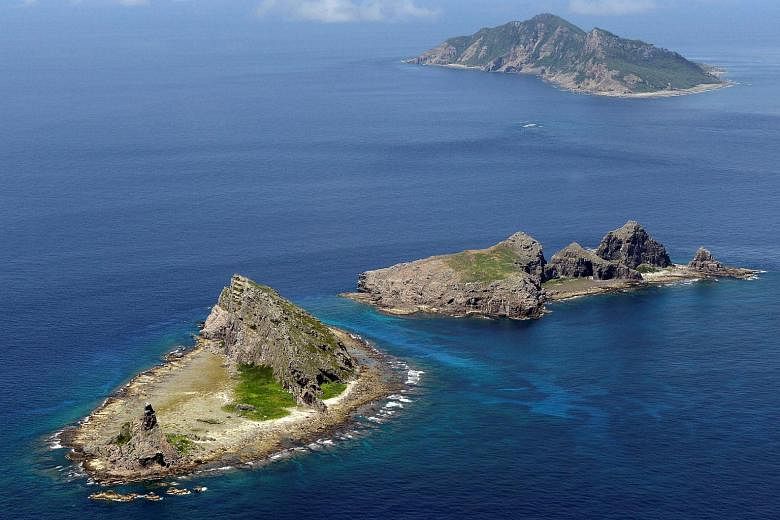Chinese military activity is escalating in the East China Sea, Japan has said, as a global think-tank called in a new report for a hotline between the two countries to avoid conflict in the contested waters.
Admiral Katsutoshi Kawano, chief of Japan's Self-Defence Forces, said yesterday that Japanese air force jets had scrambled about 200 times to counter Chinese jets from April to last month, up from 114 times in the same period last year.
The two countries are embroiled in a dispute over islets in the waterway known as Diaoyu to the Chinese and Senkaku to the Japanese. There is also an overlap in the exclusive economic zones that the two sides claim as each can claim 200 nautical miles from their coast but the sea spans only 360 nautical miles. The islets fall within the overlap.
Tensions have risen in recent years over Japan's purchase of some of the islets in 2012 and China's establishment of an air defence identification zone in the area in 2013 that overlaps Japan's. Both sides have also been enhancing their military capabilities in the sea.
Against this backdrop, a hotline will be key as a first step towards establishing a wider crisis management mechanism to avoid conflict in the East China Sea, the International Crisis Group (ICG) said in a 21-page report yesterday.
-
'Tokyo's meddling angers Beijing'
-
China is angry at what it sees as Japan "meddling" in the South China Sea, which might complicate ties between the two countries, a think-tank said yesterday.
The International Crisis Group (ICG) said Japan is not a claimant in the South China Sea but has been "one of the most vocal critics of China's actions" in the waterway.
China has competing territorial claims in the resource-rich South China Sea with four Asean states including Vietnam and the Philippines, and a separate dispute with Japan over the Diaoyu/Senkaku isles in the East China Sea.
Japan is reportedly worried that China has been escalating its activity in the East China Sea in response to Tokyo pledging aid to Vietnam and the Philippines.
In its foray into the South China Sea, Japan has argued that it has vital strategic, economic and political interests in the region, the ICG noted.
It said: "By emphasising the importance of rule of law... Japan frames China's role in that dispute as posing as great a risk to international norms as its South China Sea actions."
Walter Sim
Working-level talks on a crisis management mechanism, which have been held on and off since 2007, resumed in January last year.
But "behind the scenes, (the talks were) beginning to stall" over the scope of the mechanism.
To move the talks along, the ICG, in its report "East China Sea: Preventing Clashes From Becoming Crises", exhorted China to delink sovereignty claims from the negotiations, and not use them as a tool to exert political pressure or extract concessions from Japan.
It also called on Tokyo not to conflate and "negatively publicise" Chinese legitimate right of passage through international waters near Japan to the Western Pacific with its other actions that might have flouted international laws.
The hotline was first launched in October 2000 but abandoned as tensions arose from visits by then Japanese premier Junichiro Koizumi - who was in power from 2001 to 2006 - to the Yasukuni Shrine that commemorates Japanese war dead, including World War II war criminals, despite Chinese objections.
Restarting this hotline will "lay the foundation for regular defence contacts that, over time, could help stabilise bilateral relations and ensure continued communication between the militaries", said the ICG report, which is based on interviews with Chinese and Japanese scholars, analysts and officials.
The ICG said the hotline was "urgently needed", given the increasing unplanned contacts between Chinese and Japanese military aircraft and ships in the region.
But setting up a hotline will not be an easy task and will require steady efforts in diplomatic engagement, experts said.
Dr Tosh Minohara, professor in the Graduate School of Law at Kobe University, said a hotline is "always a great idea" so long as there are "assurances that the Chinese will pick up the phone".
Dr Chiyuki Aoi, who teaches international security at the Graduate School of Public Policy of the University of Tokyo, observed that thus far, the "basic strategic logic of China-Japan relations remains one based on deterrence and provocation", which gives rise to situations that require "such a hotline".

